
Eco-labels
If you are looking for the most sustainable way to travel and explore new places, people and cultures around the world – you came to the right place! Find sustainable hotels with Glooby.
An Eco-label offers guidance to consumers how to make eco-friendly choices. These labels are provided by organisations or states that identify products or services that have met an environmentally preferable standard. Because there are many different labels available, it is not always easy to know which one to choose and what they actually mean. We have therefore developed a structure that sorts our labels by quality and reliability. So you feel confident that your choice actually makes a difference when you book hotels with Glooby.
How Glooby guarantee quality and reliability
Glooby has several different eco-labels from organizations certifying hotels worldwide. These labels have different certification systems oh their hotels and these vary in scope.
Glooby sorts all eco-labels after a structure that takes into account quality and reliability. To do this, we follow the developed structure from the Global Sustainable Tourism Council (GSTC) whose mission is:
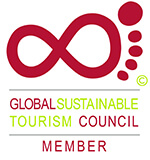
Global Sustainable Tourism Council (GSTC)
”The GSTC establishes and manages global sustainable tourism standards with the aim of increasing sustainable tourism knowledge and practices among public and private stakeholders.” For more information about the GSTC, please click here
Below we show the stucture of how we sort the hotels, where we first of all show hotels that are GSTC Approved (1), then GSTC Recognized (2) and lastly Others (3). All the hotels that are certified by one of the eco-labels are displayed in the following order in the search results.
1. GSTC Approved standards for hotels
The following standards have been Approved as in compliance with the requirements of the Manual for GSTC Approval. GSTC Approved means that a certification program is using a GSTC-recognized standard and is following processes and procedures that have been reviewed and approved by the GSTC. GSTC Approval means the GSTC has recognized that the standard used for certification is aligned with the Global Sustainable Tourism Criteria (GSTC-Recognized) and that the certification procedures largely meet international standards for transparency, impartiality, and competence.
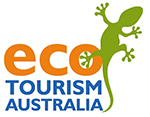
Eco Tourism Australia
Ecotourism Australia is a not for profit organisation that is focused on inspiring environmentally sustainable and culturally responsible tourism. Ecotourism Australia was formed in 1991 and is the peak industry body for ecotourism in Australia, managing four certification programs for tourism operators. Their primary product development tool, ECO certification, is a world recognised program with a UNESCO World Heritage Centre MOU and is Approved by the Global Sustainable Tourism Council. They work with and represent Ecotourism operators, Protected Area Managers, State and Regional Tourism Organisations, Government agencies and other stakeholders. http://www.ecotourism.org.au

Biosphere
ITR is an independent organization and its purpose is implementing actions and programs of sustainable development in the touristic industry. ITR follows the recommendations of the United Nations Conference on Environment and Development (UNCED, Rio 1992), and of the guidelines from several programs of the World Tourism Organization and UNESCO about sustainable development and cultural and natural heritage protection. ITR created and developed the Responsible Tourism System (STR), which is recognized by BIOSPHERE RESPONSIBLE TOURISM label. The STR promotes the sustainable touristic activities so that responsible tourism can be a specific touristic product. https://www.biospheretourism.com
2. GSTC Recognized standard for hotels
The following standards have been Recognized as aligned with either the GSTC Criteria for Hotels & Tour Operators. GSTC-Recognized means that a sustainable tourism standard has been reviewed by GSTC technical experts and the GSTC Accreditation Panel, and deemed equivalent to the GSTC Criteria for sustainable tourism and is administered by a standard owner that meets GSTC requirements. This means that the GSTC has verified that the standard aligns with the GSTC Criteria and that any additional clauses do not contradict GSTC Criteria requirements. GSTC Recognition does not ensure that the certification process is reliable, only that the standard includes the minimum elements to ensure sustainability.
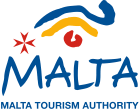
Eco certification Malta
The Malta Tourism Authority (MTA) has a diverse role, but one that in essence is all about creating and fostering relationships. The MTA is the tourism industry’s regulator and motivator, its business partner, the country’s brand promoter, and is here to form, maintain and manage meaningful partnerships with all tourism stakeholders. Primarily, this means talking to visitors to the Islands, but also to work closely alongside the private sector partners. Importantly, the MTA is also here to help strengthen the industry’s human resources, ensure the highest standards and quality of the Islands’ tourism product, and foster relations with local and international media. http://www.mta.com.mt/eco-certification

Hoteles Verdes
The Asociación de Hoteles de Turismo de Argentina (AHT)´s "Greener Hotels" Sustainable Hospitality Ecolabelling Programme promotes the adoption of good practices in sustainable hotel management in Argentina by certifying with the "Hoteles+Verdes" Ecolabel those argintenean hotels that proves being sustainable, environmentally and socially responsible with its stakeholders and tourist destinations. http://www.hotelesmasverdes.com.ar

Austrian Ecolabel
The Austrian Ecolabel ("Österreichisches Umweltzeichen für Tourismus") was the first national eco-label for tourism worldwide. http://www.umweltzeichen.at
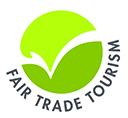
Fair Trade Tourism
Fair Trade Tourism is a non-profit organisation in South Africa that promotes sustainable tourism development. We do this through awareness raising, research and advocacy, capacity building and by facilitating the world’s first tourism Fair Trade certification programme. FTT awards the use of special label to qualifying businesses as a way of signifying their commitment to Fair Trade criteria including fair wages and working conditions, fair purchasing, fair operations, equitable distribution of benefits and respect for human rights, culture and environment. By electing to stay at or use the services of an FTT-certified establishment, tourists are assured that their travel benefits local communities and economies, and that the business is operated ethically and in a socially and environmentally responsible manner. http://www.fairtrade.travel
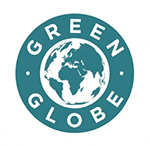
Green Globe
Green Globe provides certification, training & education, and marketing services in over 90 countries worldwide. Based in Los Angeles, California and with representations in Latin & South America, Middle East, the Caribbean, Europe and Asia, Green Globe provides certification for the sustainable operations and management of travel and tourism companies and their related supplier businesses. Separate standards are offered for Hotels/Resorts, Attractions, Organizations, Cruise Ships, Businesses (outside tourism) and Suppliers for the tourism industry. Green Globe also maintains a global network of independent auditors who provide third party inspection and validation. The Green Globe Certification Standard has been developed and improved over the past 25 years and is internationally recognized. Green Globe offers a platform for auditing and consulting companies to expand their business and to be part of an internal company. http://greenglobe.com

Green Key
Green Key is a voluntary eco-label for hotels and hostels, campsites, holiday parks, small accommodations as well as conference centres, attractions and restaurants. The Green Key award is based on compliance with strict criteria with the areas of environmental management (water, energy, waste, cleaning, etc.) and sustainability education (staff, guests, suppliers, etc.). Compliance with the criteria are confirmed through a rigorous application process and verified at onsite audits. The award is valid for one year at a time. Currently, more than 2,350 establishments in more than 50 countries are awarded with the Green Key. The programme is managed by the international charity, the Foundation for Environmental Education. Green Key is endorsed by the World Tourism Organization and recognised by Global Sustainable Tourism Council. www.greenkey.global

Travelife
The Travelife for Hotels & Accommodations international certification scheme works with its members to increase their sustainability. The Travelife criteria cover environmental, social and economic business impacts, and a hotel's success in meeting these criteria is assessed by independent auditors. Hotels meeting the Travelife standard can promote their business with the Travelife 'Gold' and 'Award of Excellence' certification marks, helping consumers easily identify more sustainable accommodation. http://www.travelife.org
3. Other standards for hotels
The following standards have not been Recognized or Approved by the GSTC. This means that the standard is not a member of the GSTC and that the GSTC has not verified the standard in any way.
This may be because the standards are not as big in sustainable tourism, that they have not applied to the GSTC or that they are operating in other countries. Whatever the reasons, we have chosen some standard that we think is trustworthy and choose to show them last in the eco-labels order. We keep track if conditions change and if they apply and are either approved or recognized be the GSTC i the future.

Svanen
The Nordic Ecolabel or 'Swan' is a voluntary ecolabelling scheme that evaluates a products impact on the environment throughout the whole life cycle. The label guarantees among other things that climate requirements are taken into account, and that CO2 emissions (and other harmful gasses) are limited - where it is most relevant.
http://www.svanen.se

Ecotourism Kenya
Ecotourism Kenya (EK), formerly known as Ecotourism Society of Kenya (ESOK), is a civil society organization that was established in 1996. Founded with enormous support from the tourism industry in Kenya, it plays a key role in ensuring that Kenya’s tourism is sustainable, both in terms of concern for the environment and for the welfare of local communities http://www.ecotourismkenya.org

EMAS
The EMAS (EU Eco-Management and Audit Scheme) is a voluntary environmental management instrument. Its objective is to improve the environmental performance of organisations by having them commit to both evaluating and reducing their environmental impact, and continuously improving their environmental performance. This scheme spans all economics including the Tourism and Service sectors and is applicable worldwide. http://ec.europa.eu/environment/emas
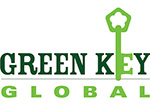
Green Key Global
For more than 15 years the Green Key Eco‐Rating Program has been evaluating and certifying properties in North America and beyond on the scope of their sustainable initiatives. http://greenkeyglobal.com

Green Tourism
GTBS is officially recognized by all the National Tourism offices in Ireland and Great Britain. http://www.green-tourism.com

Viabono
Viabono has established itself over the past decade as an independent and the leading organization for sustainability certifications in the leisure and travel/tourism industry. Viabono is the certification of tourist services that are environmentally and climate friendly, with a focus on the hospitality industry. Additionally, the certification focuses on the results of environmental indicators in the areas of water, waste, energy, climate and food. http://www.viabono.de

 Svenska
Svenska